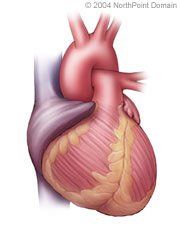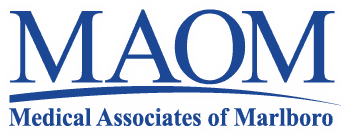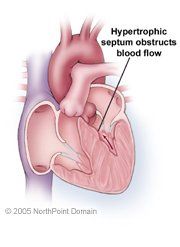Hypertrophic Cardiomyopathy
Basic Facts
- Hypertrophic cardiomyopathy means that a segment of the heart muscle wall has become abnormally thickened.
- The part of the heart that separates the right and left ventricle is called the ventricular septum. When the septum becomes excessively thick, it can partially impede the flow of oxygenated blood from the left ventricle into the aorta. This is referred to as obstructive hypertrophic cardiomyopathy.
- When the muscular walls of the ventricles become thickened, the ventricles are unable to relax sufficiently to fill with blood and the heart becomes unable to pump blood efficiently.

People usually develop hypertrophic cardiomyopathy in their teens to their early 20s. Sometimes, hypertrophic cardiomyopathy can cause an arrhythmia, a disturbance in the heart's rate or rhythm. In addition, people with hypertrophic cardiomyopathy are susceptible to endocarditis, an infection of the lining of the heart. A physician will recommend that these people take antibiotics before dental procedures and surgery to avoid endocarditis. Physicians also recommend that people with hypertrophic cardiomyopathy avoid:
- Over-the-counter cold medication;
- Stimulant narcotics (such as cocaine and methamphetamines);
- Hot tubs and saunas; and
- Strenuous exercise.
WHAT ARE THE SYMPTOMS?
Many people do not experience any symptoms until the condition is advanced. Rarely, people have no symptoms prior to sudden death. The symptoms of hypertrophic cardiomyopathy include:
- Shortness of breath;
- Chest pain;
- Dizziness;
- Lightheadedness or fainting; and
- Palpitations (awareness of one's heartbeat).
CAUSES AND RISK FACTORS
About half of the cases of hypertrophic cardiomyopathy are hereditary, possibly from genetic mutation. The rest of the cases have no identifiable cause, although long-standing high blood pressure can lead to hypertrophic cardiomyopathy.
DIAGNOSIS
A physician diagnoses hypertrophic cardiomyopathy through a physical examination. The physician may order tests to confirm the diagnosis, including:
- Electrocardiography (ECG);
- Echocardiography;
- Nuclear imaging; and
- Cardiac catheterization and angiography.
TREATMENT APPROACH
Hypertrophic cardiomyopathy is usually treated with medication, including:
- Beta-blockers;
- Calcium channel blockers;
- Antiarrhythmic drugs;
- Diuretics; and
- Anticoagulants.
For patients with high-risk characteristics, such as syncope (fainting), massive hypertrophy (more than 77 centimeters), whose cardiomyopathy has been complicated by ventricular arrhythmias, or who has a family history of sudden cardiac death, a physician may recommend implantation of an implantable cardiac defibrillator.
Copyright © 2017 NorthPoint Domain, Inc. All rights reserved.
This material cannot be reproduced in digital or printed form without the express consent of NorthPoint Domain, Inc. Unauthorized copying or distribution of NorthPoint Domain's Content is an infringement of the copyright holder's rights.

